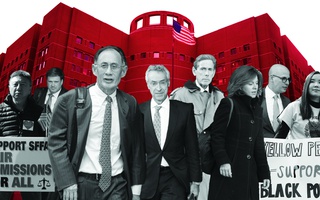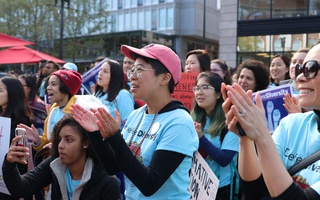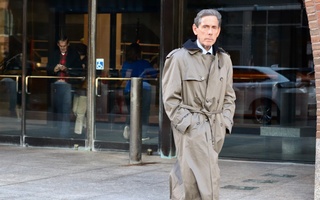The Harvard Admissions Lawsuit Decision, Analyzed
By Camille G. Caldera and Delano R. Franklin, Crimson Staff Writers
{shortcode-b470701fa8f2797a2878488a1846e0b351e97e49}
Federal judge Allison D. Burroughs ruled Tuesday that Harvard College’s race-conscious admissions process does not intentionally discriminate against Asian American applicants. Her opinion — contained in a 130-page document — outlines the facts and legal conclusions of the case between the University and anti-affirmative action group Students for Fair Admissions.
Burroughs decided in Harvard’s favor on all four counts against it and concluded that its admissions process is legally sound.
SFFA, the plaintiff, has argued that the College uses applicants’ “personal scores” and other admissions criteria to systematically disadvantage Asian Americans applicants. It also alleges that the University has not adequately explored race-neutral alternatives to increase diversity within the student body. Harvard has repeatedly denied those allegations.
The nearly five-year-long legal battle preceding Tuesday’s ruling has brought national attention to Harvard’s admissions policies. Previously secret information about the College’s admissions process has emerged, and dozens of outsiders have weighed in on the fight over affirmative action. The three-week trial in October 2018 saw students and top officials alike take the stand as the nation watched.
Though some Harvard affiliates are celebrating the decision, SFFA President Edward J. Blum wrote in an email Wednesday that he will likely file an appeal next week — a move that experts say could drag the case out for several more years.
Burroughs’s opinion contains fact-finding and legal arguments that will feature prominently in any appeals process — and could serve as a guide for future affirmative action cases. Already, SFFA remains engaged in a lawsuit against the University of North Carolina, Chapel Hill, and has re-filed a complaint against the University of Texas, Austin that was previously dismissed. The group is also searching for students who believe they were rejected by the University of Wisconsin, Madison as a result of their race.
Below, The Crimson annotates the opinion’s key findings and conclusions.
Burroughs found no evidence of qualitative discrimination
{shortcode-8dc22a463688a7ee5f49e552b1c195380ce41608}
Burroughs found that evidence presented in the lawsuit did not prove that Harvard policies are intentionally discriminatory. She wrote that she was convinced by the testimony of Harvard admissions officers, who said that their evaluations of applicants were not discriminatory.
SFFA lawyers subjected Dean of Admissions and Financial Aid William R. Fitzsimmons ’67 and Director of Admissions Marlyn E. McGrath ’70 to hours of intense questioning. The two defended the College’s policies and answered detailed questions about the way the College uses race in making admissions decisions.
“We do not endorse — we abhor — stereotypical comments,” Fitzsimmons said in his deeply personal testimony. “This is not a part of our process. This is not who I am and not who we are.”
In her opinion, Burroughs homed in on SFFA’s argument that Harvard disadvantages many Asian American students by evaluating them with negative subjective descriptors like “bland,” “quiet,” and “not exciting.” Though she acknowledged stereotypes faced by many Asian Americans, Burroughs found that SFFA did not prove that Harvard ever described students with words like “quiet” simply because they were Asian American.
Race-conscious admissions are necessary to achieve diversity
{shortcode-76766cb60b9eb86485c5c57c04a05158deb68274}
Burroughs ruled that there are no viable race-neutral alternatives that the College could use to achieve a similarly diverse student population. Throughout the trial, attorneys and expert witnesses argued over a number of potential alternatives — including providing a “tip” to applicants from disadvantaged geographic regions or offering a form of socioeconomic affirmative action.
SFFA repeatedly alleged that Harvard never fully explored race-neutral alternatives in its admissions process. Harvard in turn pointed to two committees formed in 2014 and 2017 with the explicit purpose of considering such alternatives. Those committees found that it is necessary to consider race, and Burroughs wrote that she thought the University had sufficiently considered the alternatives.
Burroughs ruled that none of the alternatives SFFA suggested were viable since they had “come at significant costs” like a decline in the “expected strength” of incoming classes and a one-third reduction in the number of African American students in incoming classes.
Statistical models were a major factor in the decision
{shortcode-8dba576e3983efaad8ab80ff5aa4b20c8a612c2c}
Statistical evidence was a major component of both sides’ arguments, and Burroughs spent more than 30 pages of her opinion parsing Harvard and SFFA’s models and analyses. Both parties hired economics professors as expert witnesses to determine whether Harvard’s admissions process disadvantages Asian Americans.
Harvard’s expert — professor David E. Card of the University of California, Berkeley — found that Harvard does not statistically discriminate against Asian Americans. SFFA’s expert, Duke University professor Peter S. Arcidiacono, came to the opposite conclusion.
{shortcode-90273c81da800c07698b67e4be612db8a58babc5}
Burroughs wrote that each expert developed a “viable econometric model,” but that she preferred a modified version of Card’s regression model. Her modified version includes interactions between variables for race and socioeconomic status. The model suggests that being Asian American is not associated with a statistically significant lower chance of admission.
The ruling relies on Supreme Court precedent
{shortcode-da43d500e614f23ea7f7ce7a05957b70615ff2cc}
SFFA alleged that Harvard’s admissions policies violate Title VI of the Civil Rights Act of 1964, which prohibits discrimination on the basis of race in federally funded institutions. Though the complaint did not argue that Harvard’s policies are unconstitutional, Burroughs drew heavily from U.S. Supreme Court opinions that upheld affirmative action policies under the 14th Amendment. She wrote that those cases “guide” the relevance of Title VI in the admissions lawsuit.
Burroughs frequently referenced the 2016 Fisher II case, which held that UT Austin’s race-conscious, “holistic” admissions policy is constitutional. In that case, the University of Texas, a public institution, was bound by the 14th Amendment. Though Harvard College is a private institution, it receives federal funding and is therefore subject to Title VI.
Burroughs also extensively cited the landmark 1978 Bakke case, as well as the 2003 Grutter and Gratz cases — representing more than four decades of precedent affirming that the government has a compelling interest in promoting diversity in higher education.
The Supreme Court specifically held up Harvard’s admissions policies as an ideal example of an affirmative action program in the Bakke case.
Harvard’s admissions process can be made better
{shortcode-b2cfabd94302dc545006359f3b8d884a3627542e}
Though she ruled that the College’s practices are lawful, Burroughs contended that the admissions process is “imperfect” and suggested a number of changes. She recommended that admissions officers participate in implicit bias trainings, maintain clear guidelines on the use of race, and monitor any race-related statistical disparities.
She said the task of considering race in admissions is a “a particularly delicate job” to execute lawfully.
{shortcode-352d88e1a31847a16424a11dc47354a8e6133a8b}
Burroughs conceded, though, that so long as race-conscious admissions policies exist, they “will always penalize to some extent the groups that are not being advantaged by the process” — though she said such a penalty is justified by an interest in diversity.
Recommended Articles
-
 Federal Judge Rules Harvard's Admissions Policies Do Not Discriminate Against Asian American Applicants
Federal Judge Rules Harvard's Admissions Policies Do Not Discriminate Against Asian American Applicants -
 Tuesday’s Admissions Decision is Only the First Step in a Long Appeals Process, Experts Say
Tuesday’s Admissions Decision is Only the First Step in a Long Appeals Process, Experts Say -
 ‘A Day of Celebrating’: Students, Administrators Praise Admissions Ruling in Harvard’s Favor
‘A Day of Celebrating’: Students, Administrators Praise Admissions Ruling in Harvard’s Favor -
 Harvard Ruling May Offer ‘Roadmap’ for Other Affirmative Action Cases
Harvard Ruling May Offer ‘Roadmap’ for Other Affirmative Action Cases

